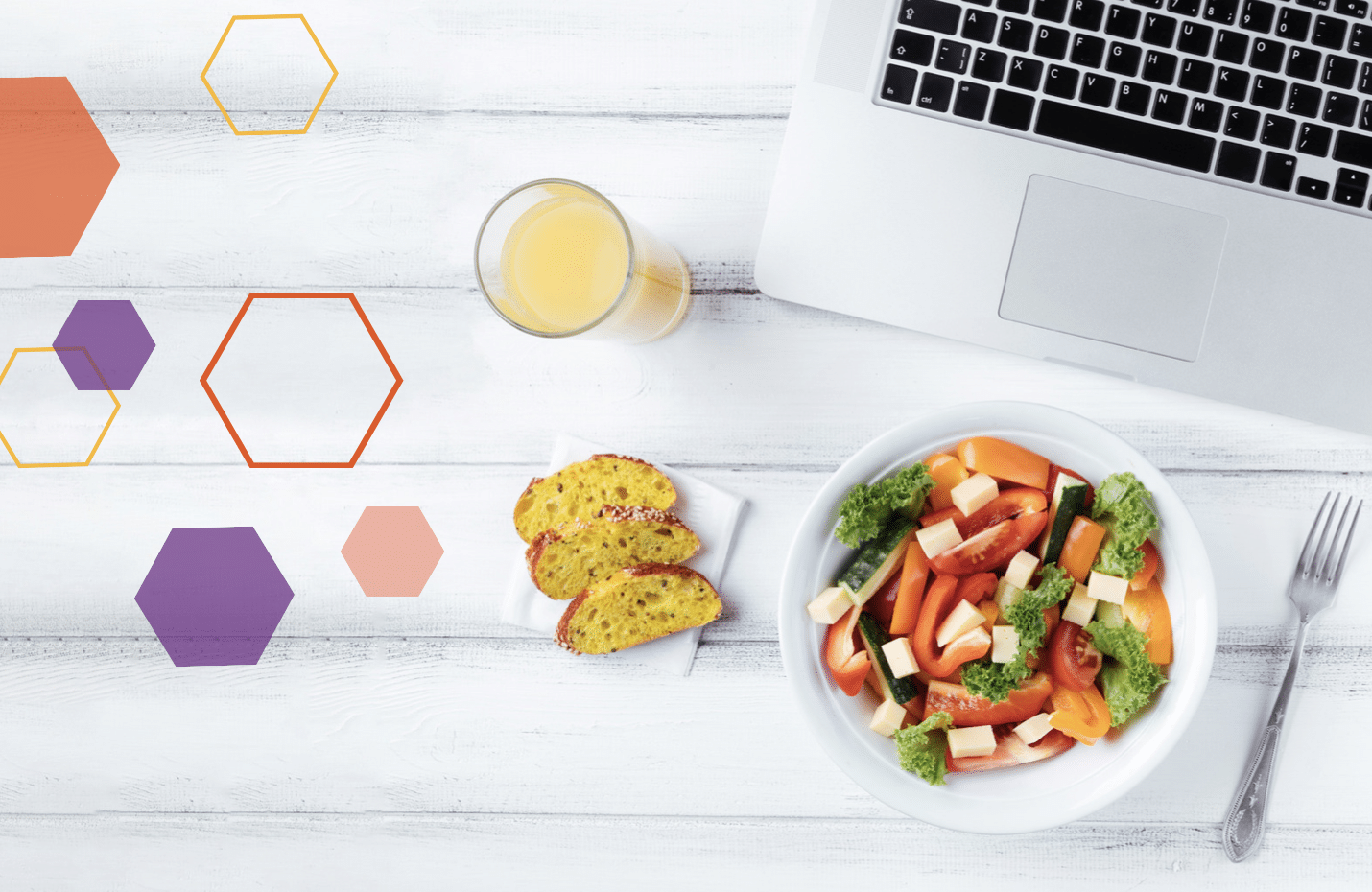Remember when lunchtime and recess were the highlights of your school day?
While the lunch boxes and activities have changed, the importance of taking lunch still rings true — no matter what your age. And yet, fewer people are taking advantage of this time and the health benefits it brings.
They instead work through that time for a variety of reasons, according to a survey from ezCater.1 Some worry their employer will look down on them, while others say they have too much work to take a proper break.
About 1 in 10 people never take a lunch break!
But skipping your lunch break isn’t doing you any favors and could do more harm than good. Here’s why taking your lunch break is essential — especially one free of screens.
Why a screen-free lunch break is important
The potential relaxation benefits of taking a break from your work will diminish if you do so while looking at a screen. To make matters worse, science has found serious repercussions for eating while distracted. Spoiler alert: it has to do with how much you eat!
According to a 2020 study published in the journal Appetite, eating while doing something that takes up a lot of your attention or engages your senses — like looking at your phone — makes it harder to recognize the cues that you’re feeling full.²
Why? Your brain filters out that information because it’s distracted. Researchers found that, in this distracted state, you’re more likely to keep snacking than if you’d been paying attention to your food while eating. Yikes!
Additional research found that mindless or distracted eating is also associated with anxiety, overeating, and weight gain. This is important news for the 46% of people who spend their lunch break scrolling on social media, according to the ezCater survey.
The benefits of taking a lunch break
So looking at your screens while eating lunch isn’t the best idea, but you should definitely still take your lunch break. Doing so can benefit everything from your mental health to your productivity, depending on your goals and priorities.
If feeling more energized is important to you, try eating lunch solo. Research in the Academy of Management Journal found that those who ate lunch alone were the most relaxed.⁴ And the ezCater survey also found that 40% of employees say taking a lunch break makes them feel less stressed.
For folks who are joining a new team or who want to boost camaraderie, opt for lunch breaks with your crew. Research on firefighters found they were more cooperative and performed better as a team when they ate together during their lunch breaks.⁵
Taking breaks helps you make better decisions too. One famous study examined Israeli judges who needed to decide whether or not to grant parole.⁶ They found that when the judges didn’t take breaks, the rate of granting paroles dropped. The researchers explain this is because the judges went with the safest, easiest, and most straightforward option due to exhaustion and “decision fatigue.”
Need another excuse for taking a break? Another study found that brief breaks help with focus during long tasks.⁷
Have you ever been so intensely focused on a task that you wound up just spinning your wheels with no end in sight? Instead of taking a break, you just push on through. That’s counterintuitive, according to research in Organizational Behavior and Human Decision Processes. The researchers found that scheduling breaks or switching between creative and mundane tasks actually encourages creativity and helps you problem-solve.

How to take a screen-free break every day
Use your screens to your advantage and pencil in screen-free time every day. Block out time on your calendar to go phone-free, and leave an away message on Slack or Teams so your coworkers know you’ll be stepping away from your computer.
Doing so will help you get a break from your desk without worrying and set an example of a boundary that your teammates can follow.
Another great way to ensure you take your lunch break is to add a layer of accountability. Opt for a lunch date with your coworker where you both agree to leave your phones silent. Better yet, set a date for a walking lunch meeting to network with other folks in your office.
Solo lunchtime walking is also beneficial. One study conducted on people in high-stress fields had people take a short walk in the park or complete mindful relaxation exercises like deep breathing. The researcher found that when people did these activities during their lunch breaks, they experienced less end-of-day dress and fatigue. They also had better concentration at work than when they took nonmindful lunch breaks.
For those working from home, taking a lunch break is equally as crucial as being in an office. Take your dog on a walk during your lunch break, or listen to a predownloaded podcast. (Yes, you are technically using your phone, but you’re not staring at a screen.)
Another favorite technique is the 20-20-20 rule. Take a break every 20 minutes to look at something 20 feet away for at least 20 seconds. It’s easy to remember and can also help with digital eye strain. You can hold yourself accountable by setting a timer to take advantage of this technique.
The Bottom Line
Take advantage of the lunch break time to give your mind and eyes a break from your work and screens. Use this time to practice mindfulness, socialize with coworkers, or fit in some movement to help you make better decisions, relax, and boost creativity.
Resist the temptation to spend your lunchtime on your phone! If you need an incentive, remember — you’re likely to eat past the point of fullness if you’re eating while scrolling. That’ll just make you even more tired later ;).
References
- https://1703639.fs1.hubspotusercontent-na1.net/hubfs/1703639/TheLunchReport_FoodImprovesProductivity_July_2022.pdf
- https://www.sciencedirect.com/science/article/abs/pii/S0195666320302919?via%3Dihub
- https://www.sciencedirect.com/science/article/abs/pii/S0195666318309991
- https://journals.aom.org/doi/10.5465/amj.2011.1072
- https://www.tandfonline.com/doi/full/10.1080/08959285.2015.1021049
- https://www.pnas.org/doi/10.1073/pnas.1018033108
- https://www.sciencedirect.com/science/article/abs/pii/S0010027710002994?via%3Dihub
- https://www.sciencedirect.com/science/article/abs/pii/S074959781630108X
- https://pubmed.ncbi.nlm.nih.gov/28358570/



